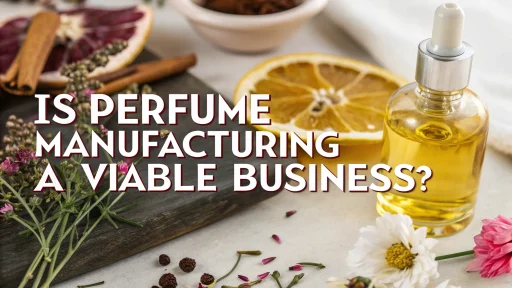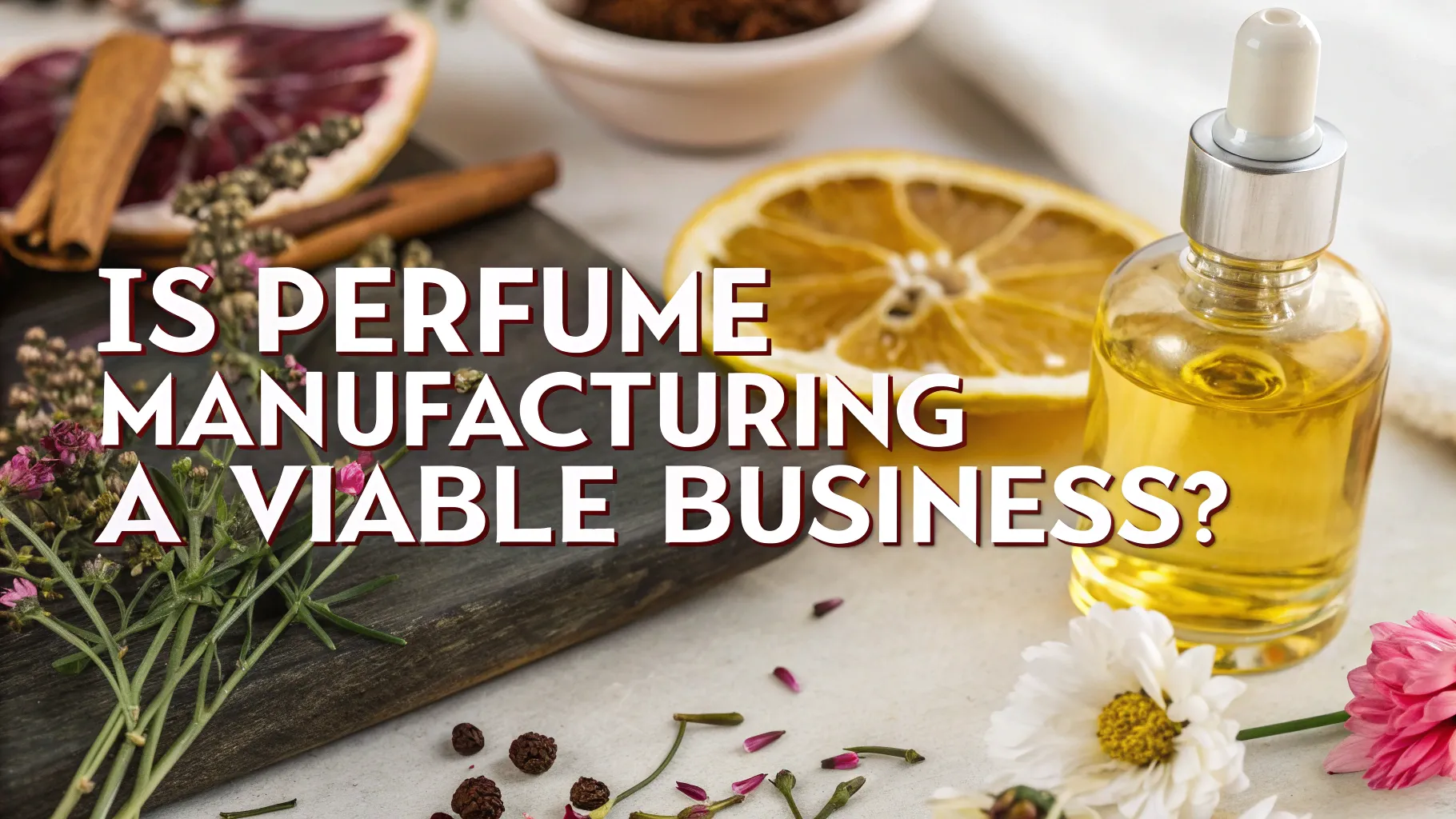Understanding the Opportunity
Once considered a luxury niche, perfume manufacturing has now evolved into an industrial business that is scalable and in high demand. The fragrance industry caters to many different consumer groups, from the budget-conscious users of deodorants and body sprays to high-income customers who want long-lasting, personalized perfumes.
As consumer habits change, personal grooming habits increase, fragrance preferences are culturally influenced, and the wellness industry grows, entrepreneurs have a great opportunity to start a business that produces perfumes. It’s not just an art, but a viable, profitable venture with steady growth prospects.
This deep dive analysis can help you make a decision if you are an aspiring businessperson wondering if perfume manufacturing is worth your time, energy, and investment.
Related: How To Start A Profitable Perfume-Making Business
Perfumes are a growing market
Understanding the market landscape and its dynamics is essential to assessing the viability of a business. The global and domestic trends for perfumes present a very promising picture.
The fragrance industry is resilient around the world, even during economic downturns, due to its association with self-worth, confidence, and identity. In 2022, the global perfume market was valued at approximately USD 50.85 billion. The market is expected to continue to grow, reaching USD 69.25 billion by 2027. This represents a compounded annual growth rate of 6.4%. The rise in luxury brands is not the only factor driving this upward trend. A growing middle class, urbanization, and a greater focus on self-care are also factors.
The Indian fragrance market is expected to surpass Rs 17,000 crore by the year 2027. India is unique in that it combines modern perfume preferences and traditional fragrance formats such as attars, essential oils, and other aromatic substances. India’s diverse cultures and deeply rooted traditions that involve aromatic substances as part of religious and everyday life, combined with its climate and climate-related products, create a dual market for alcohol-based and organic perfumes.
A second trend is that consumers are increasingly shopping for perfumes on online marketplaces such as Amazon, Nykaa and Myntra. These platforms are allowing small brands to compete with global giants directly through design, storytelling and targeted marketing.
In addition, the demand for herbal and ayurvedic fragrances is growing significantly especially among health-conscious, eco-friendly, and Islamic consumer segments creating export potential and product line extensions.
This clearly shows that not only is the market demand strong, but it’s also evolving in different directions. It offers multiple entry points for manufacturers.
Profitability and Margin Potential
The attractive profitability ratio is one of the strongest arguments for perfume production. Even when production costs are low, perfumes with clear branding tend to sell at high prices. Raw materials such as aroma chemicals, essential oils and solvents are relatively light, compact and cost-effective to store and transport.
The cost per unit of manufacturing a 50ml perfume bottle can vary between Rs50 to Rs150, depending on packaging and formulation. Retail prices for similar products can range from Rs300 to Rs2000. In most cases, this leaves manufacturers with gross margins ranging from 50% to 70%. Margins are healthy even in B2B models, such as private label manufacturing and bulk attar exports. This is due to the low weight and long shelf life of fragrance compounds.
Perfumes are also a product that is purchased repeatedly. Perfumes aren’t used just once, and then forgotten. They form part of daily life. It is important to consider the lifetime value of your customers, especially if you meet their expectations for scent longevity, aesthetic appeal, and quality.
The value of the brand and its uniqueness may also drive prices higher. Customers are willing to pay a premium price for niche stories, such as perfumes that have been inspired by Indian cities or scents created with ayurvedic plants.
When well-positioned, perfume businesses can achieve break-even faster and profitability, particularly with D2C and online distribution models.
Related: Herbal Cosmetics & Perfumes: A Widely Growing Industry
Perfume Manufacturing Scalability and Simplicity
The relative simplicity and scalability in the production process are other reasons why small and medium-sized businesses can make perfumes.
The process of perfume manufacturing involves blending fragrance oils with solvents like ethanol or water. Fixatives are added to the mix to stabilize the scent, and the mixture is aged to allow the compounds to harmonize. The perfume is then bottled and packaged after it has been aged and filtered. Even small manufacturers, who use basic stainless steel mixing vessels and manual fillers, can start operations.
It is a great business for people who want to start out small and grow organically. You can start by formulating small batches and selling them online under your brand. As demand increases, you can invest in larger machinery, new varieties, and better packaging.
This industry is also scalable in terms of product variety, not just product volume. You can produce the following under one roof:
- Perfumes
- Attar
- Body mists
- Room fresheners
- Aromatic oils for wellbeing
- Car fragrances
- Deodorants
These all share the same raw materials and packaging, so you can diversify your catalogue with minor changes to the process.
Export Potential and Global Appeal
It is not enough to capture the domestic market. India is a major player in the international trade of ayurvedic and sandalwood-based perfumes. In regions like the Middle East and Southeast Asia, Africa and parts of Europe and America, there is a growing demand for natural and organic perfumes.
Indian entrepreneurs who have the proper export certifications and licenses (such IFRA compliance or registration with DGFT) can access international markets that are highly receptive to Indian herbs and scents. Indian manufacturers are often sought by bulk buyers, distributors, and even e-commerce importers who want to supply their region with private-label or white-labeled products.
India’s rich olfactory history, rooted in Ayurveda and Mughal Attars as well as modern aromatherapy, offers a narrative edge few other countries can match.
Branding, marketing, and differentiation power
Contrary to commoditized products, perfumes are emotionally charged and aspirational. The chemical composition of perfumes is not always understood by consumers. They remember the way it makes them smell, the look of the bottle on the shelf, and the meaning behind the brand name. New brands can emerge with their own unique personality and story.
You can build strong customer loyalty by aligning your branding to your fragrance experience. Even small manufacturers can build brands with the help of social media storytelling, influencer partnerships, and digital marketing.
This strategy has helped startups like Bella Vita Organic and The Man Company gain traction in India. They launched with a niche offering, created compelling content and used e-commerce platforms for reaching targeted audiences.
The ability to create a niche and speak directly to the ideal customer while scaling quickly and with minimal overheads makes perfume a very attractive product category in today’s D2C environment.
Compliance with the Legal Environment
Contrary to the strict licensing requirements for pharmaceutical and chemical manufacturing that require hazardous materials handling, the regulatory environment for perfume production is more manageable. The main requirements for compliance include:
- If you are producing perfumes containing alcohol, you will need to obtain a cosmetics manufacturing license under the Drugs and Cosmetics Act.
- If applicable, adhere to Bureau of Indian Standards quality standards.
- Legal Metrology requires that you comply with the labeling laws, which regulate details such as ingredients, weight, batch number, and MRP.
- Registration under GST, and if you are exporting with the Directorate General of Foreign Trade.
- The State Pollution Control Board will require that you apply for a pollution control permit, especially for large and mid-sized units.
The majority of these requirements can be met without any legal complications, especially if you have the assistance of a technical advisor.
For more information check this video
Support from NPCS
For entrepreneurs who are looking to set up a manufacturing facility, accurate market and technical guidance is crucial. Niir Project Consultancy Services plays a crucial role in this regard. NPCS prepares Market Surveys and Detailed Techno-Economic feasibility Reports that are tailored to specific industrial sectors.
These reports provide in-depth information on the manufacturing process, raw materials sourcing, plant layouts, technical machinery, labor requirements, and market forecasts. These reports also contain projected financials that can be used to evaluate the sustainability of a business. Whether you are planning a small artisanal fragrance line or a mid-sized unit focused on exports, NPCS can help you assess the feasibility and startup risks of your idea with data-driven insight.
Which business to start? How to choose a business idea?
Conclusion: A Scalable and High Viable Business
The perfume industry is not only a viable enterprise, but also one of the best opportunities for entrepreneurs today. The business combines creativity in fragrance creation with an industrial production structure and modern marketing flexibility.
It offers everything that a manufacturing company should have: a growing market in India as well as globally, high margins, low logistics costs, and excellent export prospects. Branding and scent identification can be used to create customer loyalty and increase profitability.
Perfume manufacturing is an excellent business for serious entrepreneurs who are willing to invest in R&D and branding as well as smart distribution.







